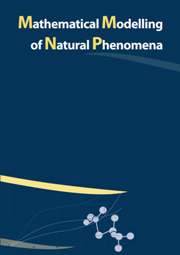Crossref Citations
This article has been cited by the following publications. This list is generated based on data provided by
Crossref.
Morozov, A.Yu.
and
Arashkevich, E.G.
2010.
Towards a correct description of zooplankton feeding in models: Taking into account food-mediated unsynchronized vertical migration.
Journal of Theoretical Biology,
Vol. 262,
Issue. 2,
p.
346.
Venturino, Ezio
2010.
Ecoepidemic models with disease incubation and selective hunting.
Journal of Computational and Applied Mathematics,
Vol. 234,
Issue. 9,
p.
2883.
Chatterjee, Samrat
2010.
Alternative prey source coupled with prey recovery enhance stability between migratory prey and their predator in the presence of disease.
Nonlinear Analysis: Real World Applications,
Vol. 11,
Issue. 5,
p.
4415.
Carlotti, F.
and
Poggiale, J.C.
2010.
Towards methodological approaches to implement the zooplankton component in “end to end” food-web models.
Progress in Oceanography,
Vol. 84,
Issue. 1-2,
p.
20.
UPADHYAY, RANJIT KUMAR
THAKUR, N. K.
and
DUBEY, B.
2010.
NONLINEAR NON-EQUILIBRIUM PATTERN FORMATION IN A SPATIAL AQUATIC SYSTEM: EFFECT OF FISH PREDATION.
Journal of Biological Systems,
Vol. 18,
Issue. 01,
p.
129.
Morozov, Andrew Yu.
2010.
Emergence of Holling type III zooplankton functional response: Bringing together field evidence and mathematical modelling.
Journal of Theoretical Biology,
Vol. 265,
Issue. 1,
p.
45.
CHATTERJEE, ANAL
and
PAL, SAMARES
2011.
EFFECT OF DILUTION RATE ON THE PREDICTABILITY OF A REALISTIC ECOSYSTEM MODEL WITH INSTANTANEOUS NUTRIENT RECYCLING.
Journal of Biological Systems,
Vol. 19,
Issue. 04,
p.
629.
Bhattacharyya, J.
and
Pal, S.
2011.
Coexistence of competing predators in a coral reef ecosystem.
Nonlinear Analysis: Real World Applications,
Vol. 12,
Issue. 2,
p.
965.
Sarwardi, Sahabuddin
Haque, Mainul
and
Venturino, Ezio
2011.
A Leslie-Gower Holling-type II ecoepidemic model.
Journal of Applied Mathematics and Computing,
Vol. 35,
Issue. 1-2,
p.
263.
Bhattacharyya, Rakhi
and
Mukhopadhyay, Banibrata
2011.
On a population pathogen model incorporating species dispersal with temporal variation in dispersal rate.
Journal of Biological Physics,
Vol. 37,
Issue. 4,
p.
401.
Morozov, Andrew
Sen, Moitri
and
Banerjee, Malay
2012.
Top-down control in a patchy environment: Revisiting the stabilizing role of food-dependent predator dispersal.
Theoretical Population Biology,
Vol. 81,
Issue. 1,
p.
9.
Upadhyay, R. K.
Volpert, V.
and
Thakur, N. K.
2012.
Propagation of Turing patterns in a plankton model.
Journal of Biological Dynamics,
Vol. 6,
Issue. 2,
p.
524.
Sen, Moitri
Banerjee, Malay
and
Morozov, Andrew
2012.
Bifurcation analysis of a ratio-dependent prey–predator model with the Allee effect.
Ecological Complexity,
Vol. 11,
Issue. ,
p.
12.
Morozov, Andrew
Poggiale, Jean-Christophe
and
Cordoleani, Flora
2012.
Implementation of the zooplankton functional response in plankton models: State of the art, recent challenges and future directions.
Progress in Oceanography,
Vol. 103,
Issue. ,
p.
80.
González-Olivares, E.
Rojas-Palma, A.
Auger, P.
Bravo de la Parra, R.
Codling, E.
Kooi, B.
Morozov, A.
Poggiale, J. C.
Tyson, R.
Tyutyunov, Yu.V.
and
Venturino, E.
2013.
Allee Effect in Gause Type Predator-Prey Models: Existence of Multiple Attractors, Limit cycles and Separatrix Curves. A Brief Review.
Mathematical Modelling of Natural Phenomena,
Vol. 8,
Issue. 6,
p.
143.
Ferreri, L.
and
Venturino, E.
2013.
Cellular automata for contact ecoepidemic processes in predator–prey systems.
Ecological Complexity,
Vol. 13,
Issue. ,
p.
8.
Cordoleani, Flora
Nerini, David
Morozov, Andrey
Gauduchon, Mathias
and
Poggiale, Jean-Christophe
2013.
Scaling up the predator functional response in heterogeneous environment: When Holling type III can emerge?.
Journal of Theoretical Biology,
Vol. 336,
Issue. ,
p.
200.
Morozov, Andrew Yu.
2013.
Dispersal, Individual Movement and Spatial Ecology.
Vol. 2071,
Issue. ,
p.
223.
Chakraborty, S.
and
Pal, S.
2019.
Advances in Mathematical Methods and High Performance Computing.
Vol. 41,
Issue. ,
p.
117.
Köhnke, Merlin C.
Siekmann, Ivo
Seno, Hiromi
and
Malchow, Horst
2020.
A type IV functional response with different shapes in a predator–prey model.
Journal of Theoretical Biology,
Vol. 505,
Issue. ,
p.
110419.


